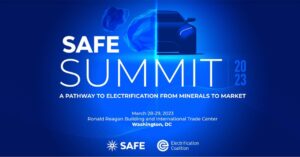Critical minerals are new geopolitical commodities
Posted by | Rauf Mammadov
Electric vehicles are driving battery plant investments in North America
LG announced on March 27th that it will quadruple its budget for its new Gigafactory in Arizona, now investing $5.5 billion to build one of the largest EV battery complexes in North America. This move is part of a trend of battery and auto manufacturers flocking to North America to benefit from the surging demand for electric vehicles (EVs).
In January 2023, all-electric vehicles accounted for 7.1% of new light vehicles, a considerable increase compared to 4.3% in January 2022. Auto manufacturers such as Ford, Honda, BMW, Toyota and VW have also pledged billions of dollars to new domestic battery and materials plants in the United States.
The eagerness of the battery manufacturers to localize their manufacturing in North America is also driven by the U.S. Treasury’s new IRA EV tax credit guidelines. The guidelines require stricter rules for the sourcing of battery components, encouraging manufacturers to deploy minerals “extracted or processed in the United States, or in any country with which the United States has a free trade agreement.”
After the U.S. Treasury announced stricter rules for the sourcing of battery components, the Biden administration quickly followed up with trade deals focused on critical minerals and clean energy technologies with Japan and Canada. These deals are a critical element of the United States’ strategy to secure reliable supply chains for procuring essential minerals such as lithium, cobalt, nickel, and manganese for battery manufacturing and decrease dependence on China, which is currently the largest exporter and processor of these minerals.
The ongoing deterioration of relations between Beijing and Washington, as well as the weaponization of energy resources by key exporters such as Russia and Saudi Arabia, has made this issue even more alarming. While these incentives and trade deals will contribute to strengthening supply chains for critical minerals, more needs to be done.
One remaining challenge is signing a similar trade deal with the EU, which is one of the three largest EV markets in the world, along with the U.S. and China. However, convincing Brussels will be challenging for both political and economic reasons. EU member states are frustrated with the introduction of the IRA subsidies, which they believe will lure away investments from Europe to the United States, and they are not enthusiastic about participating in decoupling their economies from China.
Decarbonizing transportation is necessary to move away from fossil fuel-dependent transportation, and battery manufacturing is integral to this process. However, the current dominance of China in critical minerals amidst increased tensions between Beijing and Washington means that critical minerals have already become geopolitical commodities, just like oil and gas. Businesses need clarity and certainty to invest in the EV value chain, but geopolitical realities only complicate this process.
SAFE SUMMIT

These issues were discussed at the “Pathway to Electrification from Minerals to Market” summit held in March 2023 by the Securing America’s Future Energy (SAFE) organization. Top government officials, business leaders, and stakeholders discussed how to work together to address the challenges of achieving decarbonization of transportation without compromising supply chains.
Tags: Automotive, Energy, investments, Renewables



















